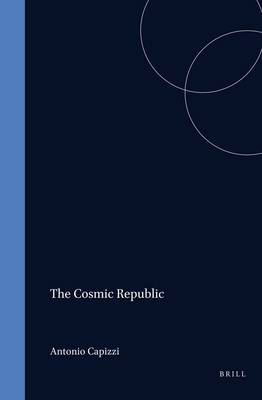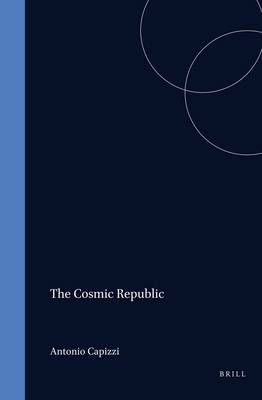
- Afhalen na 1 uur in een winkel met voorraad
- Gratis thuislevering in België vanaf € 30
- Ruim aanbod met 7 miljoen producten
- Afhalen na 1 uur in een winkel met voorraad
- Gratis thuislevering in België vanaf € 30
- Ruim aanbod met 7 miljoen producten
Zoeken
The Cosmic Republic
Notes for a Non-Peripatetic History of the Birth of Philosophy in Greece
A Capizzi
€ 201,45
+ 402 punten
Omschrijving
According to Aristotle, philosophy had come into being in the VIth century with Thales, just as a mere, disinterested pursuit of truth, a curiosity for great problems (those even-tually called "metaphysical" ones) which were substantially identical with those which Aristotle himself and his school were now raising. This abstract reading is very similar to that which views Greek poets as inspired by "eternal beauty" or by "art's for art sake" and which is nowadays completely discredited and given up by scholars of the history of literature. Against this view the present text pro-poses a new reading of the "archaic" presocratic scientists: in fact, it is about those "sages" who lived on the bound-aries of the Greek-speaking world before the concentration of such people in Periclean Athens. They were closely linked to their native towns (Miletus, Ephesus, Croto, Vele, Acragas) where they held high office; here there oral teaching and the public reading of their texts were followed closely by their fellow citizens. Thus the picture of the "cosmic republic" arises: to the "cosmic monarchy" of Homer and Hesiod (the mythical world with Zeus as the king, gods as the ministers and nature as the subject) a different mythical world succeeds. Here the earth, the sea, the sky, the human body and, generally, the "existing thing", all behave like isonomic ("republican") towns or like the governing body of these towns. Philosophy will arise later, in Athens of the Vth century.
Specificaties
Betrokkenen
- Auteur(s):
- Uitgeverij:
Inhoud
- Aantal bladzijden:
- 532
- Taal:
- Engels
- Reeks:
- Reeksnummer:
- nr. 3
Eigenschappen
- Productcode (EAN):
- 9789070265557
- Verschijningsdatum:
- 1/01/1990
- Uitvoering:
- Hardcover
- Formaat:
- Genaaid
- Afmetingen:
- 150 mm x 226 mm
- Gewicht:
- 929 g

Alleen bij Standaard Boekhandel
+ 402 punten op je klantenkaart van Standaard Boekhandel
Beoordelingen
We publiceren alleen reviews die voldoen aan de voorwaarden voor reviews. Bekijk onze voorwaarden voor reviews.








